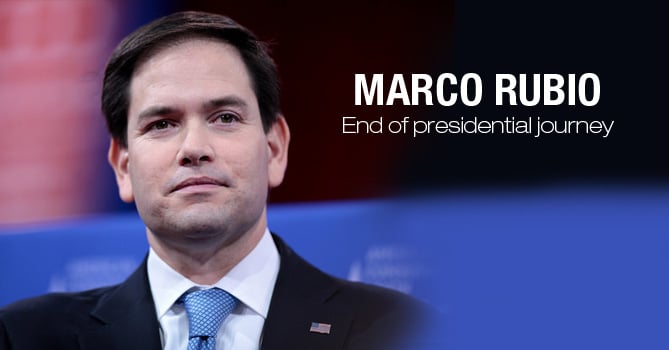The Florida Republican primary was a do-or-die battle for Marco Rubio to keep his presidential dream alive, but the Senator lost to rival Donald Trump. To make matters worse, Rubio failed to register a single win in the other four states that went to polls on March 15.
Marco Rubio had entered the US presidential race in April 2015 with a lot of expectations. He was once considered the savior of the Republicans. He was comparatively young and a working class background behind him, but the people were not yet ready to accept the Republican as the next president of the country. And this was conveyed rather rudely to Rubio at the March 15 Florida primary where the state was served to Donald Trump on a silver platter.
Possible Reasons for Marco Rubio’s Loss
There may be several reasons for Rubio’s loss but the most important of these is Donald Trump. Since the start of the Republican primaries and caucuses, Donald Trump has been on a roll and Rubio was finding it extremely difficult to surpass him. Rubio had repeatedly urged the Republicans to rally behind him to oust Trump.
From the outset, his campaigning lacked momentum. Unlike other contenders, Rubio campaigned on the ground infrequently. This was even detested by some of his supporters who began to harbor doubts on how much effort was the Republican willing to put in to get elected to the highest office. His one-dimensional strategy during campaigns and was too personality-centric.
But Rubio has largely blamed the collapse of his campaign on people’s anger at politicians who have been in the past indifferent to the conditions of the working class. According to him, “millions of people in this country are tired of being dismissed by the self-proclaimed elitists.”
Adding to these were the reports of his not attending the Senate sessions. He had reportedly missed around half of the committee meetings. There were also claims that he had one of the worst voting records of the Senate. The situation reached to such an end that many Florida newspapers called for his resignation.
The Issue of Immigration
The immigration issue proved to be another big problem for Marco Rubio. In 2013, the Florida Senator had joined the Senate’s ‘Gang of Eight’, which played a pivotal role in bringing comprehensive immigration reform back to the legislative branch in the spring of 2013. Though passed by the Senate, but the bill never came up in the House. It was quickly denounced by the hardliners as a form of amnesty. Though Rubio had renounced the legislation, his decision to join the Senate’s ‘Gang of Eight’ backfired as he lost support of the conservatives as the 2016 campaign began.
In fact, Rubio’s campaigning had never delivered on its potential and this was clearly visible in the Republican primaries and caucuses that began on February 1 with Iowa. It has been reported that Rubio had spent much of the summers avoiding voters.
From there, the situation only went downhill. He lost state after state, only claiming victories in Minnesota, Washington D.C., and Puerto Rico. The Florida primary, which is incidentally his home state, put an untimely end to his campaigning and witnessed his ouster.
The signs that Rubio would not win Florida were quite visible as Bush opted not to endorse him. However, the biggest mistake that Rubio had made was before the start of the Super Tuesday contests on March 1 where he had badly floundered. He made a serious attempt to take down Donald Trump, who was inching closer to nomination. In doing so, he heaped personal insults on the billionaire. This was a huge miscalculation, which Rubio later regretted.
What does Rubio’s Future Look Like?
Now the question that arises is that where would Rubio go from here? At the moment, he does face an uncertain future. At the start of his presidential campaign, Rubio had announced that he would not be seeking a re-election to the Senate, whose term ends in January. However, some media reports have speculated that Rubio might run for the Governor of Florida in 20018 after the current governor Rick Scott completes his second term. But at 44, Marco Rubio is young and has a long political future ahead of him. Moreover, he can seek inspiration from Ronald Reagan, who lost the 1976 presidential nomination to Gerald Ford, and went on to win the 1980 presidential elections.
Read More:
- Obama’s Cuba Visit: Symbolism and Optimism
- Facts about Bernie Sanders you should know
- Fate of Julian Assange Hangs in Balance
- Most powerful people of the world
- US Presidential Election 2016 Facts
- Taiwan elects first female President
- US Gun Laws: Obama’s Push for Reforms
- Who will be the next U.S. President?
- Democracies Around the World

